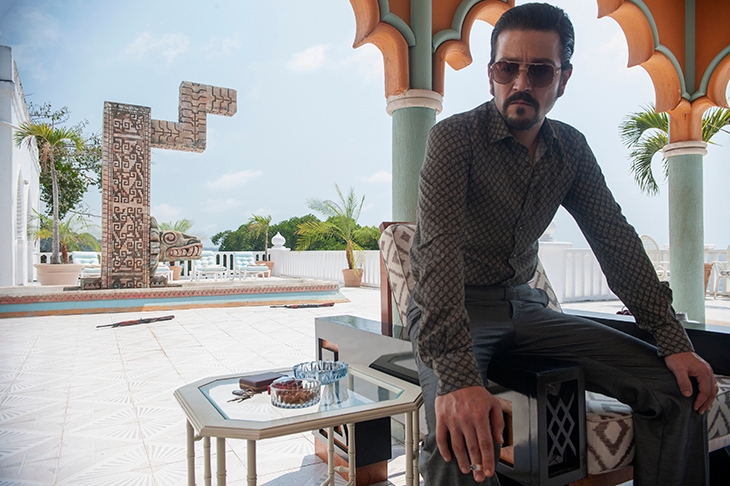Narcos is back on Netflix, set in Mexico this time, with a cool, world-weary, manly voiceover swearily lecturing us at the beginning that if we smoked sensemilla in the 1970s, then we were partly responsible for the bloody, endless drug wars that went on to kill more than half a million people.
Oh really? Sensemilla (derived from the Spanish for ‘without seeds’) is the kind of product of human ingenuity and free markets we should be celebrating, not decrying. It’s more compact than bog-standard weed, making it easier for entrepreneurs to ship, thereby increasing their profit margins. It affords a sweeter-tasting hit and a more euphoric high, thereby giving greater pleasure to the consumer.
Of course I empathise with the victims of the drug wars, such as the 43 students kidnapped and massacred in Iguala, Mexico, in 2014. And, more recently, with the hapless location scout Carlos Munoz Portal, murdered last year while looking for places to film this very season of Narcos. But the idea that those of us who like the odd puff are responsible for their fate is ludicrous. Nor am I persuaded that cheeky lines any of us may have snorted over the years contributed to the deaths of anyone murdered in Colombia by the Medellin and Cali cartels. It was prohibition that caused the criminality, not the product.
But I think that even Narcos understands this on some level. It’s why, as you did with young Pablo Escobar in the early episodes of season one, you find yourself instantly warming to Felix Gallardo (Diego Luna), the former police officer who decided to do his bit for the local community by transforming it into ground zero for the global marijuana production industry.
We begin in the mid-1980s in the Mexican state of Sinaloa. Thanks partly to First Lady Nancy Reagan’s tiresome ‘Just Say No’ campaign and thanks partly to federal government muscle-flexing, the unruly state has been invaded by the brutal military who are busily torching all the marijuana crops on which the peasants have come to depend.
Enter Gallardo with a bright idea. If they plant more marijuana it will only get burned again. But what if instead they reach an accommodation with the cartel in Guadalajara — a more populous, wealthy city that the government would never dare treat so disrespectfully? There they can grow this new super-strain (sensemilla) developed by Gallardo’s little brother, which needs to be cultivated in remote places, isolated from pollinators. Everyone will win from this profitable and sensible arrangement, right?
Well not quite, no. I don’t want to give the game away with any plot spoilers, but you’ve probably guessed already that the Guadalajara cartel — run by brothers with the worst haircuts you have ever seen — aren’t going to give away half their franchise with a smile and a handshake. And so the cycle of violence begins.
Meanwhile, on the other side of the fence, we meet Kiki Camarena (Michael Pena), an eager young DEA agent with the big advantage over most of his US colleagues that he looks Mexican, speaks fluent Spanish and grew up in Guadalajara. I’m sure we’ll get to like him, as we did the agents in the last three seasons. But as with that sententious anti-drugs message at the beginning, I find it hard to root for anyone involved in an organisation that does such obvious harm.
If there’s one thing we’ve learned from four seasons of Narcos, it’s that prohibition just makes things worse. What might otherwise be mom and pop organisations — growing weed or coca for the market in much the way they might coffee or bananas — are instead forced to become pawns of the vast, increasingly vicious and heavily tooled-up criminal empires that are the only organisations with the money and muscle to take on the feds.
Much has been written about They Shall Not Grow Old (which I hope you caught while it was still available on BBC iPlayer), in which director Peter Jackson has mined the Imperial War Museum archives and compressed all the best eyewitness accounts of trench warfare on the Western Front to make the first world war seem as fresh and vivid as if it happened yesterday. I just wanted to congratulate Jackson on one of the most superb pieces of trolling I’ve ever witnessed on TV.
I’m referring to the section, right near the beginning, where the veterans recall how they felt about the war. One after another — I’ve spoken to veterans who felt the same way about the second world war — they say they wouldn’t have missed it for the world. So basically, from Wilfred Owen to Joan Littlewood and Blackadder, we’ve been sold a pup: the bleeding heart lefty version of history, as so often, is far removed from real people’s lived experience.







Comments